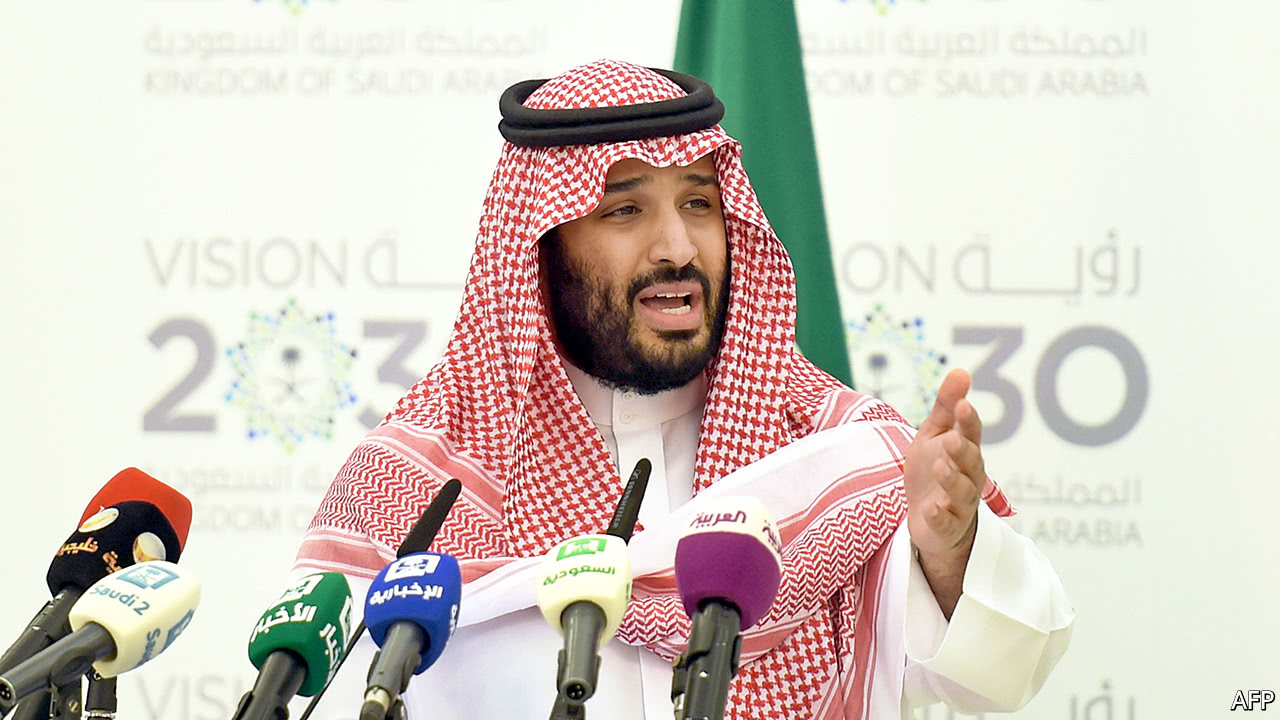It is suffering from the whims of a capricious crown prince

THE proposal to sell shares in Saudi Aramco, the world’s biggest oil company, stunned the financial markets last year. Muhammad bin Salman, now Saudi Arabia’s crown prince, promised that it would be the biggest initial public offering (IPO) of all time, valuing Aramco at $2trn. It was to be the centrepiece of his plan to transform the Saudi economy, reducing its dependence on oil. It was meant to foster financial transparency and accountability in one of the world’s most hermetic kingdoms. Above all, it would cement the young prince’s image as a bold moderniser soon to inherit the throne.
Alas, youthful impatience appears to have got the better of him. His tendency to micromanage the IPO and vacillate over where Aramco should be listed has caused delay and confusion. Matters came to a head this week when advisers, speaking anonymously, and company executives doing the same, gave conflicting reports, suggesting a mutinous atmosphere.
The kingdom’s advisers say privately that the decision to list in New York or London has been postponed, and that the plan “for now” is to issue shares on Riyadh’s puny Tadawul exchange, with a private placement possibly to Chinese investors. But Khalid al-Falih, the oil minister and Aramco’s chairman, insisted the IPO would go ahead at home and abroad next year as originally planned. Company officials scorn the idea of listing only on the Tadawul, which would be swamped by an Aramco IPO.
The confusion appears to have originated from the royal palace. From the outset, MBS, as the crown prince is known, has insisted that the firm should be valued at no less than $2trn, and that the IPO should happen next year. He had not fully appreciated either the threat of lawsuits related to the terrorist attacks of September 11th 2001 that could result from listing on the New York Stock Exchange, or the complexities of issuing shares on the London Stock Exchange, where institutional investors are angry about efforts to water down listing rules for Aramco. He wrongly assumed that, given the huge fees promised to bankers and advisers, other actors in the world of finance would bend the knee.
Listing initially on the Tadawul only, as well as doing a private placement, may be a misguided attempt by MBS to skirt some of these difficulties, advisers say. It is seen as a way to promote the Saudi capital markets, and avoid the impression of selling off the family silver to foreigners. But with a limited pool of capital in the kingdom, some say a listing there could never raise the $100bn that MBS needs for his so-called Public Investment Fund to bankroll non-oil investments in the country.
Advisers say the kingdom is also considering recent expressions of interest by Chinese oil companies and other Asian investors, who are keen to take up to a 5% stake in Aramco. The attraction is that it would further cement ties between the world’s biggest producer and huge consumers of oil. But it would be unlikely to give the crown prince the $2trn valuation he wants, unless he guarantees large supplies of cheap oil as a side deal.
The confusion is uncomfortable for Aramco, which, as national oil companies go, should be an attractive bet for investors. It has 15 times more reserves of oil and gas than ExxonMobil, its biggest private competitor, higher production, fewer employees and lower costs per barrel. It also has an abundance of young (including many female) engineers, and technology that can almost visualise the sea of oil beneath the desert sands. Its executives say that efficiencies inherited from the days that it was American-owned persist. Many Aramcons, as company officials are known, appear to view the IPO as an unwelcome distraction, but are at least mollified by the prestige they think an international listing would confer.
To achieve that goal, MBS may need to reflect further on what an IPO means. His government is Aramco’s only shareholder and should, of course, have the final say. But unless he is prepared to loosen the reins, allow the IPO to advance at a prudent pace, and let investors decide what the correct value is, he might do better to scrap it altogether. His attitude so far suggests too little faith in the market forces that he wants to unleash.
No comments:
Post a Comment
Note: Only a member of this blog may post a comment.